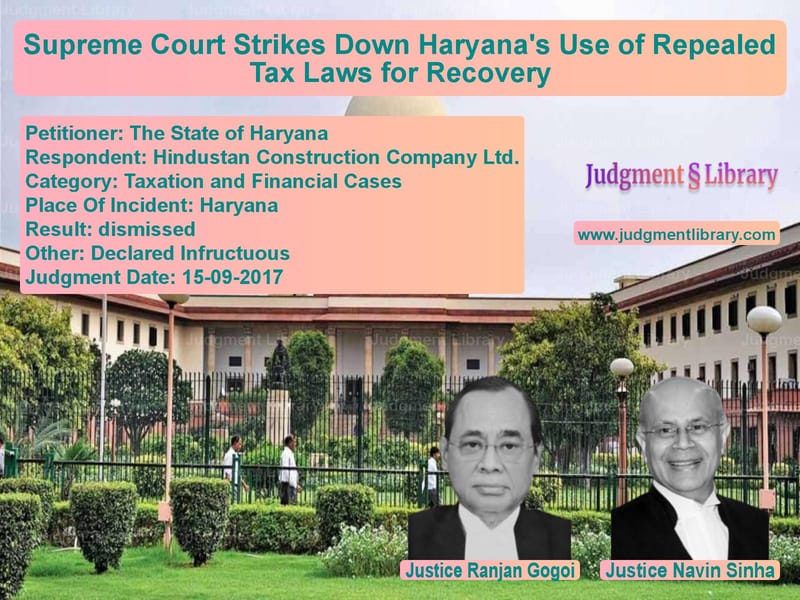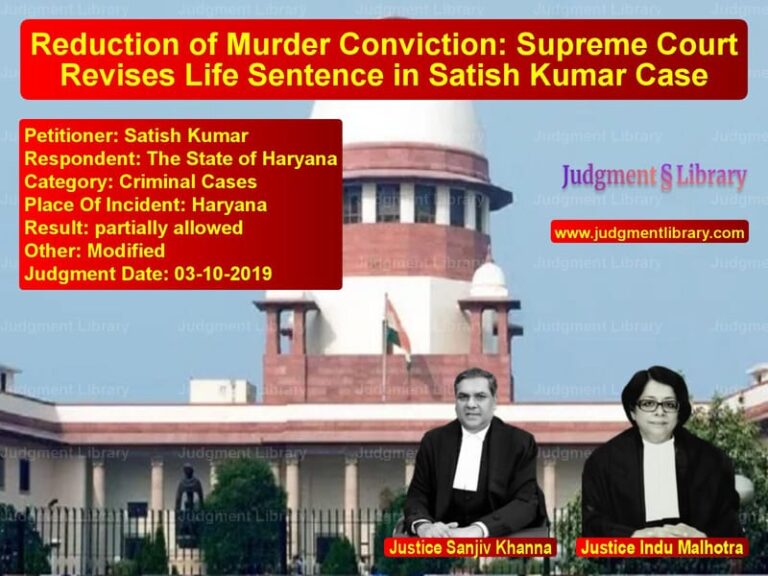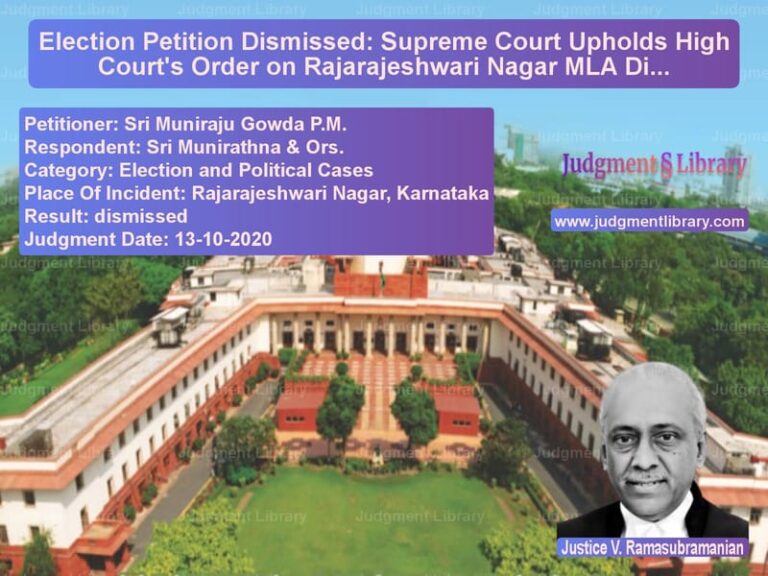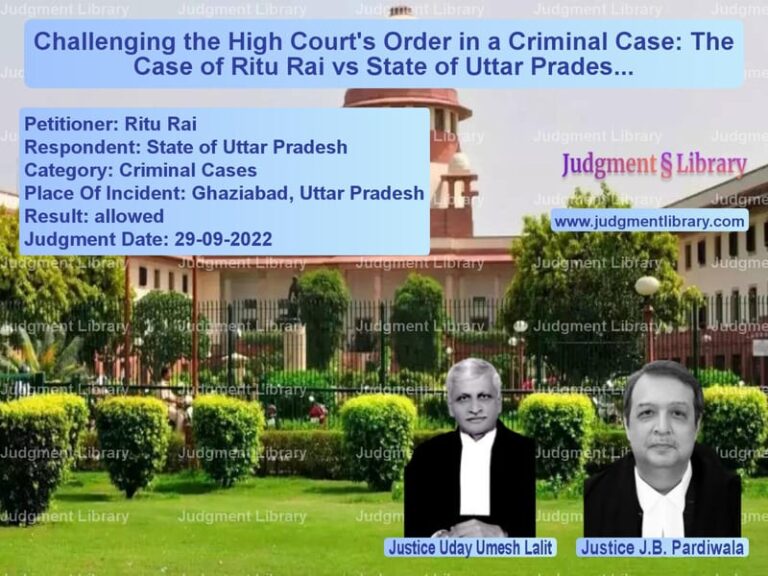Supreme Court Strikes Down Haryana’s Use of Repealed Tax Laws for Recovery
The case of The State of Haryana & Ors. vs. Hindustan Construction Company Ltd. revolves around the question of whether the State of Haryana could invoke Section 40 of the repealed Haryana General Sales Tax Act, 1973 for tax recovery after the enactment of the Haryana Value Added Tax Act, 2003. The Supreme Court had to determine whether tax recovery proceedings under a repealed statute were legally sustainable.
Background of the Case
The dispute arose when the State of Haryana attempted to revise a tax refund granted to Hindustan Construction Company Ltd. for the financial year 1998-99. The assessment under the 1973 Act was completed on May 12, 2000, and a refund was issued. However, after the Haryana Value Added Tax Act, 2003, came into force on April 1, 2003, the State issued a show-cause notice to the respondent on June 7, 2004, questioning the refund and demanding Rs. 65,35,632 under its revisional powers.
The respondent challenged this move before the Punjab and Haryana High Court, which ruled in its favor, holding that the revisional power under the 1973 Act could not be exercised post-repeal, as the new Act only preserved pending proceedings.
Legal Issues
The Supreme Court examined three primary issues:
- Whether the State could exercise revisional power under Section 40 of the repealed Act when no proceedings were pending on the date of repeal.
- Whether Section 4 of the Punjab General Clauses Act, 1898, could be invoked to justify retrospective application of the repealed Act.
- Whether the amendments made to the 2003 Act in 2010 had any bearing on the case.
Arguments by the Petitioner (State of Haryana)
The State argued:
- The revisional power under Section 40 of the repealed Act remained available for a period of five years.
- Since the refund was wrongly obtained, the State was justified in reviewing the assessment.
- Section 4 of the Punjab General Clauses Act allowed for the continuation of liabilities and obligations even after repeal.
- The decision in Raymond Ltd. vs. State of Chhattisgarh (2007) supported the view that tax authorities could exercise revisional powers to correct erroneous refunds.
Arguments by the Respondent (Hindustan Construction Company Ltd.)
The respondent countered:
- The repeal and saving clause in Section 61 of the 2003 Act only preserved pending proceedings, and no such proceedings were pending when the new Act came into force.
- The Punjab General Clauses Act could not override the clear legislative intent of the 2003 Act.
- The Haryana government amended the 2003 Act in 2010 to expand its powers, which showed that its earlier interpretation was incorrect.
Supreme Court Judgment
The Supreme Court ruled against the State of Haryana, affirming the High Court’s decision. The key findings were:
- The repeal and saving clause in Section 61 of the 2003 Act only saved pending proceedings, not fresh revisions.
- There were no pending proceedings against the respondent at the time of repeal, making the revisional action legally untenable.
- Applying the Punjab General Clauses Act would contradict the express intent of the 2003 Act, which sought to limit post-repeal actions.
- The 2010 amendments to the 2003 Act further demonstrated that the State had no power to invoke the repealed law at the time it attempted recovery.
Observations of the Supreme Court
The Court remarked:
“When a new Act is enacted on the same subject, the applicability of the General Clauses Act must be tested against the legislative intent of the new Act.”
The judgment further stated:
“There were no pending proceedings when the repeal took effect. The attempt to invoke revisional power post-repeal was legally unsustainable.”
Significance of the Ruling
The ruling sets a precedent for the application of repeal and saving clauses in tax laws. The judgment highlights:
- The limitation of State powers post-repeal in fiscal matters.
- The importance of legislative intent in interpreting tax laws.
- The need to avoid retrospective application of repealed laws.
Conclusion
The Supreme Court’s ruling in The State of Haryana vs. Hindustan Construction Company Ltd. clarifies the legal position on tax law repeals. By rejecting the State’s attempt to revive a repealed provision, the Court reinforced the principle that fiscal statutes must be strictly interpreted. This decision prevents undue harassment of taxpayers and ensures that government actions remain within legally defined limits.
Don’t miss out on the full details! Download the complete judgment in PDF format below and gain valuable insights instantly!
Download Judgment: The State of Haryana vs Hindustan Constructi Supreme Court of India Judgment Dated 15-09-2017.pdf
Direct Downlaod Judgment: Direct downlaod this Judgment
See all petitions in Income Tax Disputes
See all petitions in Tax Refund Disputes
See all petitions in Banking Regulations
See all petitions in Judgment by Ranjan Gogoi
See all petitions in Judgment by Navin Sinha
See all petitions in dismissed
See all petitions in Declared Infructuous
See all petitions in supreme court of India judgments September 2017
See all petitions in 2017 judgments
See all posts in Taxation and Financial Cases Category
See all allowed petitions in Taxation and Financial Cases Category
See all Dismissed petitions in Taxation and Financial Cases Category
See all partially allowed petitions in Taxation and Financial Cases Category







